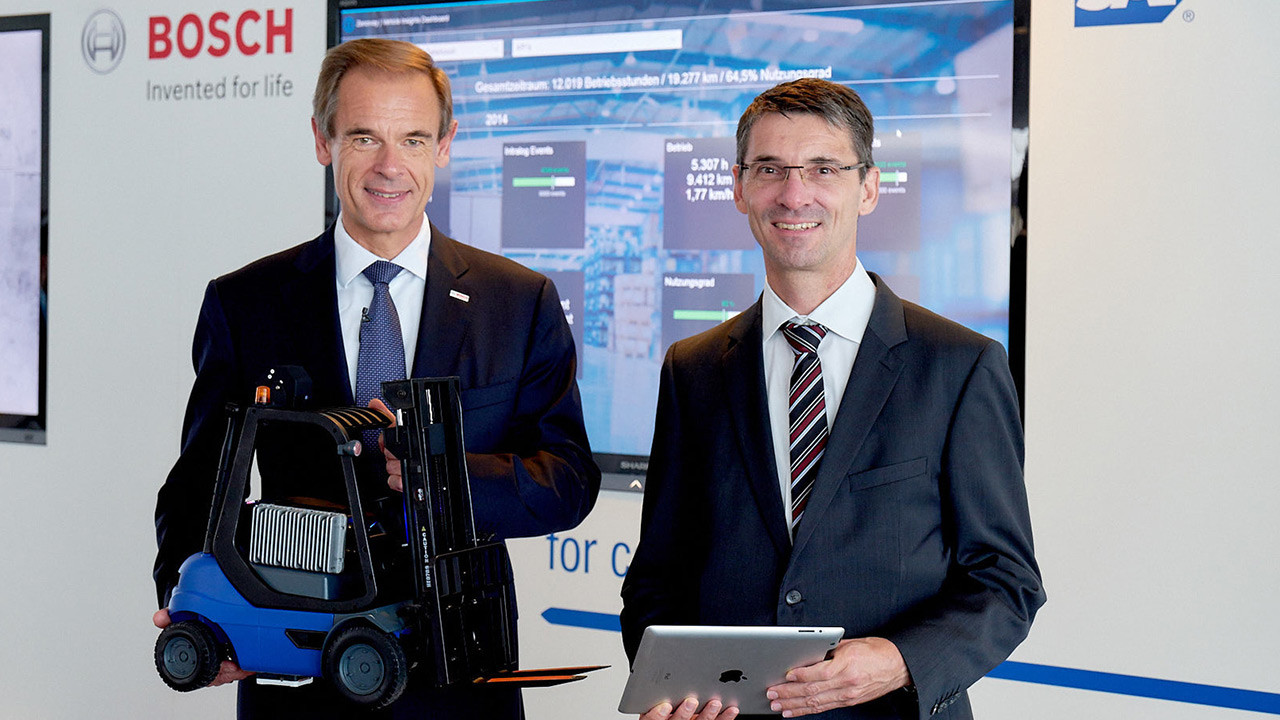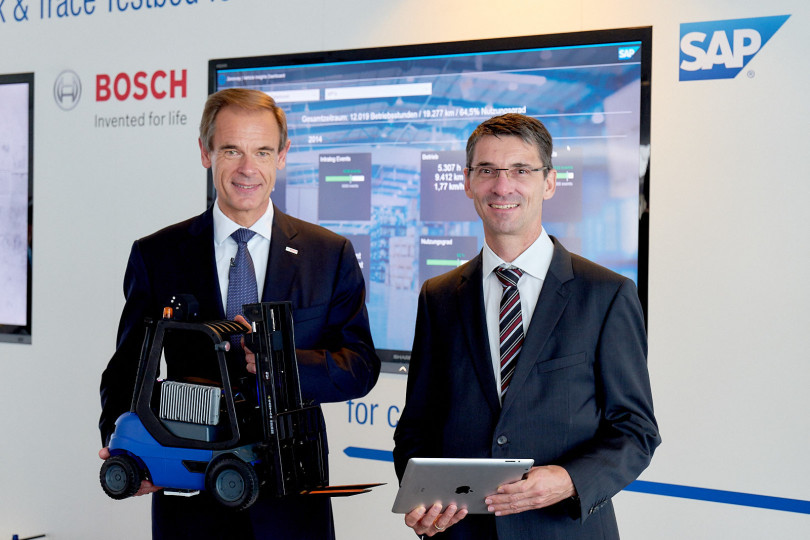Walldorf/Stuttgart – Stronger together than apart: Bosch and SAP have agreed to form a strategic partnership for the internet of things (IoT) and Industry 4.0. Both companies want to expand their collaboration on cloud technologies and soft-ware solutions. Their joint approach promises to speed up manufacturing and lo-gistics processes and to increase the safety and quality of products and services for customers. “In order to make even better use of the major potential that con-nected industry holds, international companies must cooperate more closely than before, and they must base that cooperation on open standards,” said Bosch CEO Dr. Volkmar Denner at the signing of the relevant memorandum of under-standing. Bernd Leukert, member of the SAP Executive Board responsible for products and innovation, added: “New solutions that offer a high degree of cus-tomer benefit will appear only when companies concentrate on their strengths and their core competencies while also pooling their respective strengths.”
Customers benefit from new, smart solutions
To this end, there are plans to enable customers to use the SAP HANA database platform in the Bosch IoT Cloud. The aim is to process large quantities of data for IoT applications in real time. In addition, Bosch and SAP will work to combine their software and cloud expertise in the future. Bosch IoT microservices will be made available on the SAP HANA cloud platform, as a way to connect different devices and components. This includes enabling secure and more efficient con-nectivity for vehicles, manufacturing machinery, or tools with various, and prefer-ably open platforms. The aim is always to offer customers new, smart services. For instance, connected cordless screwdrivers can report their location down to the nearest centimeter to the production system, which can then select the torque appropriate to each screwdriver’s task. The result is increased efficiency in production. Fast databases such as SAP HANA are a prerequisite for saving, processing, analyzing, and presenting large quantities of data from connected in-dustry. All the systems both Bosch and SAP develop are focused above all on data security and privacy. Both companies protect customer data with state-of-the-art technology. Customers can decide themselves whether to make personal data available and when it should be deleted.
Industry 4.0 calls for standardized conditions
“To get IoT and Industry 4.0 solutions implemented universally, we need stand-ards and reference architectures,” Denner said. On the topic of standardization, Denner and Leukert expressed their support for close coordination with the inter-nationally oriented Industrial Internet Consortium (IIC) and with the Germany-based Plattform Industrie 4.0. The aim is to institute a set of standardized condi-tions that will support the interoperability of machinery in the world of industry. “Joint testbeds are a tried and trusted approach toward that aim, with partners working together to test the interplay of sensors, machinery, software, and cloud technology, and to derive standards from that,” Leukert said.
Reduced outlay, increased efficiency
One specific example of cooperation between the two international companies is positional data for forklifts, increasing the transparency and efficiency in logistics. In an existing IIC-coordinated testbed known as Track&Trace, it is now possible to determine the location of forklifts in large warehouses, aircraft hangars, or in-dustrial sites in real time and to the nearest centimeter. Zeno Track, a start-up founded by Bosch, pinpoints the forklifts using cameras, GPS, laser scanners, ra-dio, and connected motion sensors. The location data is transferred via the Bosch IoT Cloud to the SAP Vehicle Insights fleet management system. As a re-sult, vehicle fleets can be managed intelligently and in a way that best supports the planning and fulfillment of transport orders or maintenance schedules. This reduces outlay and increases efficiency. The cooperation between Bosch and SAP shows how the interplay of sensors and software enables the creation of new services that go beyond individual companies.
Platform technologies are building blocks for the internet of things
Moreover, the two companies aim to develop further solutions in areas such as automated and connected driving. These always produce great quantities of data that must be evaluated quickly and reliably. “Databases and platform technolo-gies are fundamental building blocks for new solutions in the internet of things and Industry 4.0. We would like to put these at the disposal of customers, part-ners, and users worldwide,” Leukert said. Denner continued: “Bosch can draw on extensive sensor systems experience in the areas of mobility, manufacturing, consumer goods, and connectivity. By combining all this, we aim to help our cus-tomers generate new sales.”
Mónika Hack
+36 70 510 5516
About Bosch
The Bosch Group is a leading global supplier of technology and services. It employs roughly 375,000 associates worldwide (as of December 31, 2015). The company generated sales of 70.6 billion euros in 2015. Its operations are divided into four business sectors: Mobility Solutions, Industrial Technology, Consumer Goods, and Energy and Building Technology.
The Bosch Group comprises Robert Bosch GmbH and its roughly 440 subsidiaries and regional companies in some 60 countries. Including sales and service partners, Bosch’s global manufacturing and sales network covers some 150 countries. The basis for the company’s future growth is its innovative strength. Bosch employs 55,800 associates in research and development at 118 locations across the globe. The Bosch Group’s strategic objective is to deliver innovations for a connected life. Bosch improves quality of life worldwide with products and services that are innovative and spark enthusiasm. In short, Bosch creates technology that is “Invented for life.”
The company was set up in Stuttgart in 1886 by Robert Bosch (1861-1942) as “Workshop for Precision Mechanics and Electrical Engineering.” The special ownership structure of Robert Bosch GmbH guarantees the entrepreneurial freedom of the Bosch Group, making it possible for the company to plan over the long term and to undertake significant up-front investments in the safeguarding of its future. Ninety-two percent of the share capital of Robert Bosch GmbH is held by Robert Bosch Stiftung GmbH, a charitable foundation. The majority of voting rights are held by Robert Bosch Industrietreuhand KG, an industrial trust. The entrepreneurial ownership functions are carried out by the trust. The remaining shares are held by the Bosch family and by Robert Bosch GmbH.
Additional information is available online at: www.bosch.com, www.bosch-press.com, twitter.com/BoschPresse
About SAP
As market leader in enterprise and application software, SAP SE helps companies of all sizes and industries run better. From back office to boardroom, warehouse to storefront, desktop to mobile device – SAP empowers people and organizations to work together more efficiently and use business insight more effectively to stay ahead of the competition. SAP applications and services enable approximately 320,000 business and public sector customers to operate profit-ably, adapt continuously, and grow sustainably. For more information, visit www.sap.de



